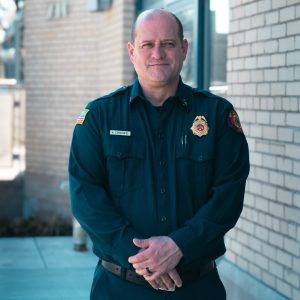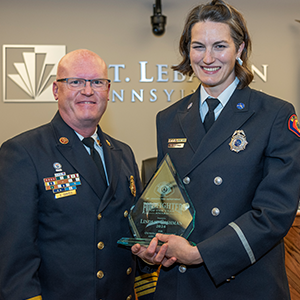public safety
VEST FOR SNIEPER For two days this winter Pittsburghers awaited news about Rocco, a Pittsburgh Police Department K9 officer who had been stabbed in the line of duty and eventually died from his wounds. In response, many Mt. Lebanon residents queried Mt. Lebanon Police Department about the safety of its newest K9 officer, Snieper, a Belgian Malinois born in Holland.
Currently Snieper does not have a protective vest, but he will soon. Because a vest impacts the dog’s maneuverability, he needs to complete his initial training before learning to work while wearing a vest. Snieper, who joined the department in May 2013, is still in training with his handler, Officer Ben Himan. K9 vests come in several models—some are bulletproof, others are bulletproof and stab resistant. “We will purchase the one that is most effective for Snieper,” says Deputy Police Chief Aaron Lauth. A vest can cost between $1,000 and $2,500; a concerned resident has already offered to purchase Snieper’s vest.
Snieper is certified through the Pennsylvania Police Work Dog Association and the North American Police Work Dog Association to perform narcotics detection, article searches, tracking and criminal apprehension. In addition to enforcement duties, Snieper and Himan participate in the department’s outreach activities, including foot patrols and neighborhood visits.
Also in response to Rocco’s killing, State Sen. Matt Smith of Mt. Lebanon co-sponsored Rocco’s Law, a bill that would toughen the penalties for killing or severely injuring a police dog, elevating the crime from a third-degree to a second-degree felony, increasing the maximum penalty from seven years in prison and a $15,000 fine to 10 years and $25,000.
WORKING TOGETHER The South Hills Area Council of Governments (SHACOG) is working with the police departments in the 20 South Hills communities it represents to create an independent cooperative investigative team. The team would work much like SHACOG’s community emergency critical incident response team (CIRT), a group of police officers from several of the SHACOG police departments trained for high-risk incidents—such as hostage situations or shooting incidents—but the new team would consist of trained police investigators who would work together on surveillance, undercover operations and investigative work.
The plan is to pull the team together on an as-needed basis for cases that otherwise would tax the resources of an individual department, such as burglary rings and drug investigations. Police officers who would like to join the team must apply and will be selected based on their background and training.
Since police departments often work together on a case, it makes sense to have a team of specialists ready to go. “Criminals don’t respect municipal boundaries,” says Police Chief Coleman McDonough. A good example of the work the team could do is a wiretap. If a police department did not have the equipment or an officer trained in wiretapping, it could call in the team, which would be funded through SHACOG dues. SHACOG is currently writing procedures and looking for unit leaders.
HEART STOPPING Every year, nearly 300,000 people in the U.S. experience a sudden cardiac arrest. To survive, immediate treatment, such as CPR, is imperative. Even better is the use of an Automated External Defibrillator (AED), a device that provides an electrical shock to a heart that has stopped. According to the American Heart Association, 90 to 95 percent of heart attack victims die because they didn’t have quick access to lifesaving treatment.
Mt. Lebanon patrol cars and fire trucks are equipped with AEDs and more than a decade ago Mt. Lebanon installed AEDs in its public facilities—ice rink, library, municipal building, pool, rec center, golf course and public works facility. These devices are housed in brightly colored cases and are usually mounted on walls so they can be easily seen.
But after 10 years, the municipality’s AEDs are aging. The 2014 capital budget set aside $42,000 for new units. Cost for the 27 units came in under budget at $31,000.
Two additional AEDs were included in that purchase and will be installed this spring in to-be-determined locations along the Washington and Beverly road business districts. Check upcoming issues of mtl for the locations. These units feature heavy-duty waterproof cases to protect them from the elements.
The good news about AEDs is that you don’t have to be trained to use them—the manufacturers have made them very user-friendly. Once the unit is opened, the machine talks you through the process. Each AED features self-adhesive paddles with drawings that show where to place them on the chest. The AED monitors the heart rhythms and will not provide a shock if the assessment does not indicate sudden cardiac arrest.





